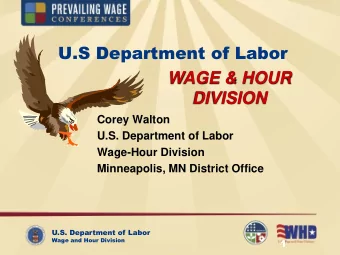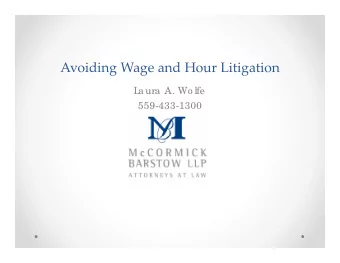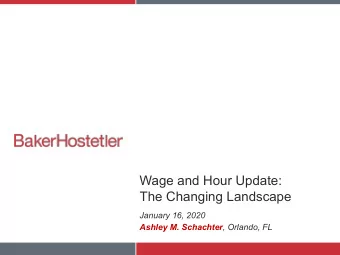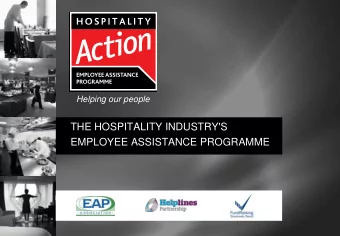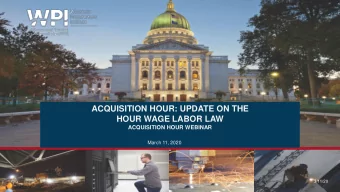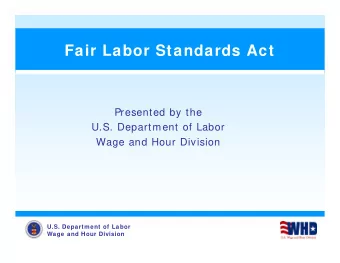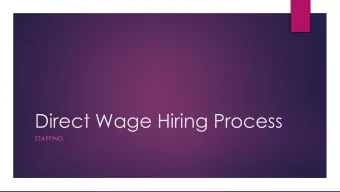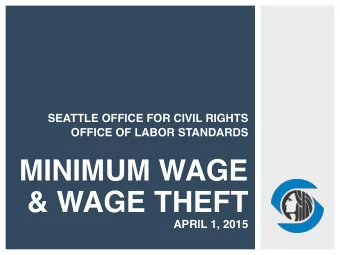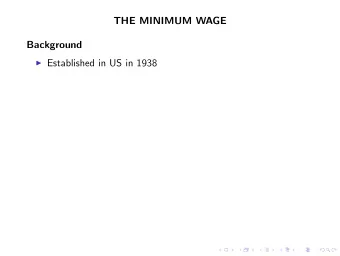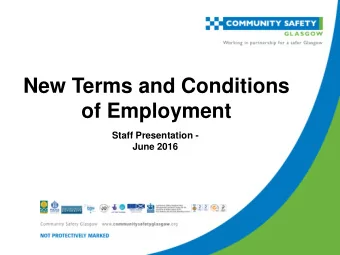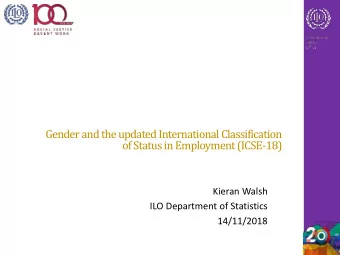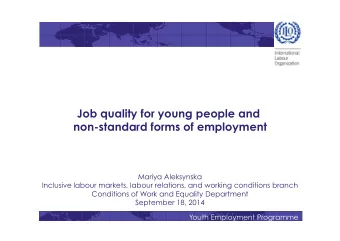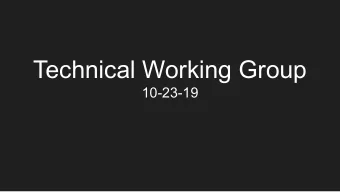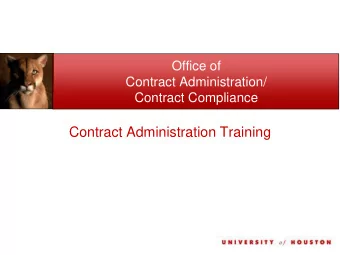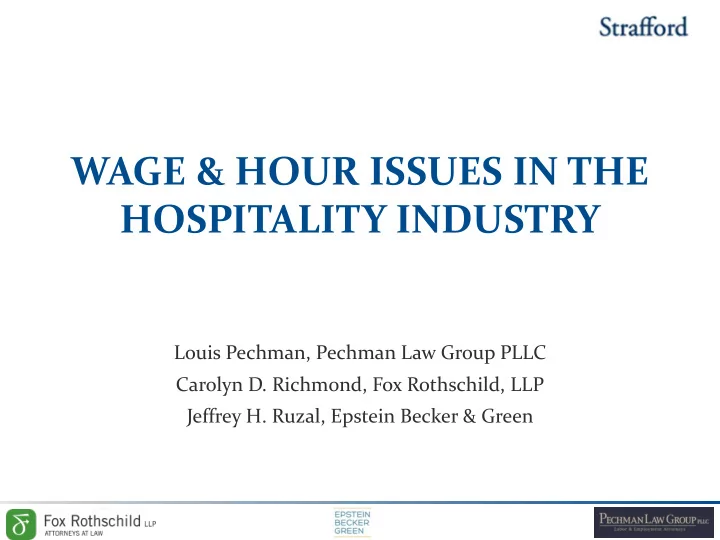
WAGE & HOUR ISSUES IN THE HOSPITALITY INDUSTRY Louis Pechman, - PowerPoint PPT Presentation
WAGE & HOUR ISSUES IN THE HOSPITALITY INDUSTRY Louis Pechman, Pechman Law Group PLLC Carolyn D. Richmond, Fox Rothschild, LLP Jeffrey H. Ruzal, Epstein Becker & Green Where is the litigation? Types of Claims most often brought in
WAGE & HOUR ISSUES IN THE HOSPITALITY INDUSTRY Louis Pechman, Pechman Law Group PLLC Carolyn D. Richmond, Fox Rothschild, LLP Jeffrey H. Ruzal, Epstein Becker & Green
Where is the litigation? • Types of Claims most often brought in Restaurant Pay Lawsuits Overtime: off the clock o Misclassification o Meal/rest breaks o Minimum Wage o Tip pooling o 2
Tipped Employees and the Tip Credit • A “tipped employee” is defined as “any employee engaged in an occupation in which he customarily and regularly receives more than $30 a month in tips.” 29 U.S.C. § 203(t) Employers can take a tip credit and pay tipped employees less than the full • minimum wage, as long as certain specific requirements are met. Currently, after the application of the tip credit, tipped employees can be paid • $2.13/$7.25 with overtime. For the tip credit to be allowed, the employer must prove that: • (1) the tipped employee “has been informed by the employer of the o provisions of this subsection,” and (2) “all tips received by such employee have been retained by the employee, o except that this subsection shall not be construed to prohibit the pooling of tips among employees who customarily and regularly receive tips.” 29 U.S.C. § 203(m). 3
Tipped Employees: FLSA Tip Credit Notice “The burden of proof is on employers to show that they are entitled to take the tip credit.” Fast v. Applebee's Int'l, Inc., No. 06 Civ. 4146, 2010 U.S. Dist. LEXIS 19571, at *23 (W.D. Mo. Mar. 4, 2010). Employers must specifically provide tipped employees with the following information: • (1) the amount of cash wage they are paying tipped employees; o (2) the additional amount claimed by the employer as a tip credit; o (3) that the tip credit claimed by the employer cannot exceed the amount of tips o actually received by the tipped employee; (4) that all tips received by tipped employees are to be retained by the employee, o except for a valid tip pooling arrangement limited to employees who customarily and regularly receive tips; and (5) that the tip credit will not apply to any tipped employee unless the employee o has been informed of these tip credit provisions. See Dept. of Labor Fact Sheet #15: Tipped Employees Under the FLSA. 4
Overtime Pay for Tipped Employees To calculate unpaid overtime wages under the FLSA, one must first determine • the employees’ regular rate of pay for the relevant workweeks. See 29 U.S.C. § 207(a)(1). • “Where the employer takes the tip credit, overtime is calculated on the full minimum wage, not the lower direct (or cash) wage payment.” U.S. Dep’t of Labor, Wage and Hour Division, Fact Sheet #15: Tipped Employees Under the Fair Labor Standards Act (FLSA), see also 29 CFR 531.60. 5
State Specific Tip Credit/Pay Requirements 7 states and Guam prohibit a tip credit o More than 24 states and DC have a higher tipped minimum wage than the o federal tipped minimum wage Alabama, Louisiana, Mississippi, South Carolina and Tennessee have no o state minimum wage laws Alaska, California and Nevada require overtime for work in excess of 8 o hours a day New York requires a “spread of hours” payment equal to the full o minimum wage where a spread of more than 10 hours a day is worked. 6
Tips: Who do they belong to? • In addition to limiting a tip pool to individuals in occupations who customarily and regularly receive tips, employers are also ineligible to participate in a tip pool. • “Customarily, front-of-the-house staff like servers and bartenders receive tips. Back-of-the-house staff like cooks and dishwashers do not, and thus cannot participate in a mandatory tip pool.” Roussell v. Brinker Int'l, Inc., 441 Fed. Appx. 222, 225 (5th Cir. 2011). “A tight management group…should not be able to enhance its profits by • forcing its tipped employees to share their tips with management while paying those employees less than minimum wage.” Chung v. New Silver Palace Rest. Inc. , 246 F .Supp.2d 220, 231 (S.D.N.Y . 1998). 7
Tipped Employees: Deductions from Gratuities (breakage, credit card deductions, customer walkouts) • “To the extent Plaintiffs were not permitted to retain their tips to pay for shortages and unpaid tabs, Defendants disqualified themselves from taking advantage of the FLSA tip credit provisions.” Bernal v. Vankar Enters ., 579 F . Supp. 2d 804, 810 (W.D. Tex. 2008) “The Department of Labor has long construed the FLSA to permit the employer’s reduction • of an employee’s charged tip by the amount of a service toll associated with settlement of that debited perquisite.” Myers v. Copper Cellar Corp., 192 F .3d 546, 555 (6th Cir. 1999). The Department of Labor’s Manual explains: • Where tips are charged on credit cards, WH [the Wage and Hour Division] will not question the reduction of the credit card tips paid over to the employee if the amount deducted is no greater than the percentage charged by the credit card company. For example, where a credit card company charges an employer 5 percent on all sales charged to its credit service, the employer may pay the employee 95 percent of the tips without violating FLSA. U.S. Dept. of Labor Field Operations Handbook § 30d05(a) (Dec. 9, 1988). 8
Tipped Employees: 80/20 Rule • “If a tipped employee works two jobs, one in which his work customarily and regularly produces tips and one in which it does not, the employee is considered in dual occupations, and the tip credit may not be taken for any hours worked in the non-tip-producing occupation.” 29 C.F .R. § 531.56(e). “Where a tipped employee spend[s] a substantial amount of time (in excess of 20 percent • in the workweek) performing [duties related to the tipped occupation that are not directed toward producing tips], no tip may be taken for the time spent in such duties.” U.S. Dep’t of Labor, Wage and Hour Division, Fact Sheet #15: Tipped Employees Under o the Fair Labor Standards Act (FLSA), see also DOL’s Field Operations Handbook § 30d00(e), available at http://www.dol.gov/whd/foh/index.htm. “DOL regulatory guidance has clarified that employers may not take advantage of the tip • credit with respect to hours worked by employees performing non-tipped tasks to the extent that such employees spend more than 20 percent of their working time performing non-tipped work. Thomas v. Apple-Metro, Inc ., 14 Civ. 4120, 2015 WL 505384, at *4 n.1 (S.D.N.Y . Feb. 5, 2015). 9
Shaving/Editing Time • Compensable time under the FLSA is far-reaching: employees must be paid for all time they are “suffer[ed] or permit[ted] to work.” 29 U.S.C. § 203(g). The regulations further explain this broad standard: Work not requested but suffered or permitted is work time. For example, an o employee may voluntarily continue to work at the end of the shift. He may be a pieceworker, he may desire to finish an assigned task or he may wish to correct errors, paste work tickets, prepare time reports or other records. The reason is immaterial. The employer knows or has reason to believe that he is continuing to work and the time is working time. 29 C.F .R. § 785.11. “[I]t is the duty of the management to exercise its control and see that the o work is not performed if it does not want it to be performed. It cannot sit back and accept the benefits without compensating for them. The mere promulgation of a rule against such work is not enough. Management has the power to enforce the rule and must make every effort to do so. ” 29 C.F .R. § 785.13. 10
Rest and Meal Breaks (“Complete Relief” Standard) • No requirement for Rest Breaks under the FLSA Short breaks (5-20 minutes) must be counted as compensable time. o Bona Fide meal periods are NOT compensable time • Bona fide meal periods are not worktime. Bona fide meal periods do not include coffee o breaks or time for snacks. These are rest periods. The employee must be completely relieved from duty for the purposes of eating regular meals. Ordinarily 30 minutes or more is long enough for a bona fide meal period. A shorter period may be long enough under special conditions. The employee is not relieved if he is required to perform any duties, whether active or inactive, while eating. For example, an office employee who is required to eat at his desk or a factory worker who is required to be at his machine is working while eating. 29 CFR § 785.19(a). “[U]nder the FLSA, the employee bears the burden to show that his or her mealtimes were • compensable work.” Hertz v. Woodbury County, 566 F3d 775, 784 (8th Cir. 2009) 11
Misclassification of Restaurant Employees as Exempt/Salaried Employees • The FLSA’s minimum wage and overtime requirements do not apply to “any employee employed in a bona fide executive, administrative, or professional capacity.” 29 U.S.C § 213(a)(1). To qualify for Executive Exemption: an employee must (1) be paid a salary of at least • $455 per week; (2) have a primary duty [that] is management of the enterprise in which the employee is employed or of a customarily recognized department or subdivision thereof; (3) customarily and regularly direct[] the work of two or more other employees; and (4) have the authority to hire or fire other employees or have significant input into hiring, firing, and advancement decisions. 29 C.F .R. § 541.100(a). • “The term ‘primary duty’ means the principal, main, major or most important duty that the employee performs.” 29 C.F .R. § 541.700(a). 12
Recommend
More recommend
Explore More Topics
Stay informed with curated content and fresh updates.
